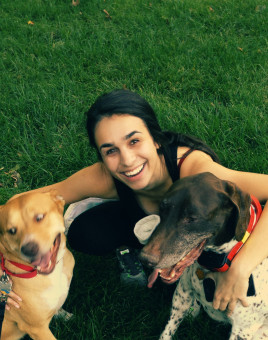
Maral G. Cavner ’18 is Corporate Outreach Manager for Animal Equality, an international animal protection nonprofit that works in eight countries across four continents. In her role at Animal Equality, Maral advocates, collaborates, and negotiates with major food businesses worldwide to adopt or strengthen meaningful farmed animal welfare policies.
During her three years at Lewis & Clark, Maral directed the Animal Legal Defense Fund student chapter, served as the Submissions Editor of the Animal Law Review, clerked with the Animal Legal Defense Fund (ALDF) and the Humane Society of the United States, volunteered actively with Humane Society International, and became a first-place recipient of the Advancement of Animal Law Scholarship from ALDF and the Animal Law Leadership Award from the Animal Law Program faculty. She also earned a Certificate in Animal Law.
Maral joined Animal Equality shortly after law school. Her corporate policy development work often sees her engaging with international companies, which presents an opportunity to help develop global standards for animal welfare. For example, in 2020, Maral helped draft and attain the first country-wide corporate standard and commitment to broiler chicken welfare in Australia while working with the lead executives based in the United States for their own policy. In keeping her eye out for international opportunities in every meeting with food businesses, Maral pushes them to adopt a standard for 100% of their supply chain, even when their supply chain presently exists only in one country due to the increasing vertical integration of food businesses and the high likelihood that such companies will expand to other countries in the future—thus leaving no opportunity for animals on the table.
One of the most hopeful aspects of Maral’s international animal law work is the collaboration with her international coworkers and colleagues at sister organizations in the Open Wing Alliance (OWA), a collective of around 80 different animal protection nonprofits in 63 countries. Through the OWA, Maral can rely on country-specific experts to help collectively apply pressure and fine-tune her efforts for successful multi-country policy development. Additionally, having so many international colleagues helps Maral learn of new policy opportunities across the world and bring them to the U.S. and the global companies she works with. One promising example of this is in-ovo sexing, a technology that could spare billions of male chicks born into the egg industry a grim end due to their lack of ability to lay eggs. This technology is something that some countries in the European Union have mandated the use of, but, until recently, has been untapped here in the United States. Maral has successfully pitched the technology to some of the largest global food giants in the world, which would not have known about the technology in the first place were it not for the strong collaboration amongst her international colleagues. Maral fondly credits her time in the Animal Law Program, especially with its LLM students who, often from different parts of the world, helped Maral better appreciate the diverse landscapes in their countries and how to connect with individuals from across the globe for the betterment of animals.
The Development & Alumni Office is located in room #301 of Legal Research Center on the Law Campus.
MSC: 51
email lawalum@lclark.edu
voice 503-768-6890
The Development & Alumni Office
Lewis & Clark Law School
10101 S. Terwilliger Boulevard MSC 51
Portland OR 97219